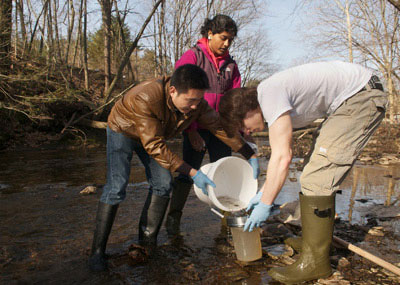The College of Arts and Sciences offers interdisciplinary majors and minors that do not reside within a department or program. These programs provide a blend of different disciplines from more than one area and can be combined with a variety of majors that are offered throughout the University.
Interdisciplinary Majors
BS in Environmental Science

If you have an interest in biology or chemistry and care about finding solutions to environmental problems and addressing sustainability issues, consider our environmental science major. At UHart, we offer you research and internship opportunities to jump start your career or prepare you for graduate studies. You choose from two concentrations, one focused on environmental biology and the other centered on environmental chemistry. Both options provide you with the benefit of working with our expert faculty across a wide range of subject matter.
Read more about degree requirements and career opportunities.
BA in Environmental Studies

If you have an interest in shaping environmental policy, addressing sustainability issues, and taking on environmental challenges, consider our interdisciplinary program in environmental studies. You choose from two concentrations, one focused on environmental policy and the other centered on environmental communication. Both options provide you with the benefit of working with our expert faculty across a wide range of subject matter. The program will help you develop cross-cutting and interdisciplinary skills to prepare you to address environmental issues through policy initiatives and/or communication strategies. We also offer a minor in environmental studies.
Read more about degree requirements and career opportunities.
Interdisciplinary Minors
Africana Studies

The Africana Studies minor uses an interdisciplinary framework to explore the historical, political, cultural, and economic experiences of people of African descent around the world. There is a specific regional emphasis on the African continent, the Caribbean, and the Americas. Using the theoretical and methodological approaches of Africana studies, our goal is to equip you with the analytical skills required to produce creative scholarship across disciplines. An interdisciplinary minor can maximize your potential because you learn to articulate your perspectives to different audiences in other fields. The program also hosts events that function as a platform for sharing innovative projects with the larger University community.
You must complete 18 credits that include an introductory Africana Studies course, two electives in the social sciences, two electives in the humanities, and three credits of unrestricted electives. In addition, three credits toward the minor must be taken at the 300 level or above. Examples of courses include:
- The Study of the Black Experience
- The Black Family in American Society
- Urban Politics
- African American Music
- African American Women Writers
- Race and Ethnic Relations
For more information, and to see a complete list of minor requirements, visit the Course Catalog.
The backgrounds and research interests of our faculty are very diverse and include the social sciences and the humanities, in addition to practitioners in the fields of law, social work, and development. You will have opportunities for mentorship both academically and professionally.
Environmental Studies

The Environmental Studies minor gives you the opportunity to better understand environmental issues and to contribute more fully to modern society. The program is designed to foster an appreciation for science, social science, and humanities attitudes and approaches to studying the environment. You learn problem solving and decision making, skills and gain experience in an interdisciplinary setting.
You must complete 19-21 credits including the following courses:
- Fundamentals of Environmental Studies
- Environmental Studies Capstone
In addition, electives are required in the Environmental Studies and Environmental Sciences categories. Examples include:
- Environmental Communication
- Writing and the Environment
- Mind and Nature
- Living in the Environment
- Introduction to Environmental Science
- Ecology
For more information, and to see a complete list of minor requirements, visit the Course Catalog.
Gender and Sexuality Studies

The Gender and Sexuality Studies minor is interdisciplinary in nature, and includes courses on gender identity, women’s roles in society, women writers, men and masculinity, and human sexuality. The curriculum draws upon the expertise of faculty in several colleges across the University.
- Introduction to Gender and Sexuality Studies (Required)
- The History of Women in America
- Women’s and LGBTQ+ Social Movements
- Philosophy of Love and Sexuality
- Men and Masculinities
- Gender and Sex in Popular Culture
For more information, and to see a complete list of minor requirements, visit the Course Catalog.